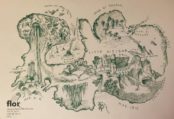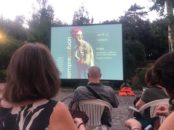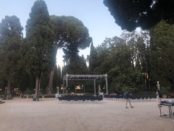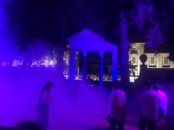TourFest 2024 | A warm and sharing ambience to address political and social issues
Sempre più fuori a Roma con Paola Di Mitri, Roberta Torre e Babilonia Teatri
 How happy I am to finish my Italian trip of festivals with Rome. In a way, I am already going home. I always felt at home in Rome, there is something familiar to me in the way of life there. Something between Nice and Paris. I am so delighted that I do not even care about the 39 degrees of the city.
How happy I am to finish my Italian trip of festivals with Rome. In a way, I am already going home. I always felt at home in Rome, there is something familiar to me in the way of life there. Something between Nice and Paris. I am so delighted that I do not even care about the 39 degrees of the city.
Since the 8th of July, Sempre più fuori, a festival of theatre, dance, music, cinema, literature and art has been happening in the city of Roma. The festival takes place between the Accademia Tedesca Roma Villa Massimo and the Goethe Institute and is organised by Antonino Pirillo and Giorgio Andriani.
Terre sconosciute by Paola Di Mitri
First night in Rome : I go to the Goethe Institute where I start by seeing an exhibition Terre sconosciute made by the writer, director and performer of documentary theatre and documentary films Paola Di Mitri and Cranpi, a company created in 2015 by Antonino Pirillo and Giorgio Andriani, in order to promote the theatrical culture through the production and distribution of performances by artists, companies and authors.
I enter an imaginary expedition on the island of the South Pacific Ocean, called Flor. Imaginary travellers brought back the archives of their discoveries in a room of the Goethe Institute. I feel like a child who has found a secret island. Many discoveries are documented, there is a drawn map of the island as well as videos telling about life there. I can even encounter the surprising creatures our imaginary pioneers have met on Flor island…

The map of Flor island!
After my voyage, I go in the garden of the institute, where I find a food truck and a little bar. Time for some refreshments and a tiny meal before an open air screening.
Here, there are no invisible voices in speakers telling you the event will start in ten minutes, here there is a feeling of togetherness, nothing is anonymous, although we are in Rome. We are a group of people that are not too big, waiting to watch the film and this is Antonino Pirillo and Giorgio Andriani who come in front of the screen to tell us the documentary is about to start. They seem delighted to be here tonight, as the rest of us are. There is an intimate ambiance and warm smiles on people’s faces.

Le Favolose by Roberta Torre
Tonight, I am watching Le Favolose made in 2022 by Roberta Torre, a director who was born in Milan in 1962. This documentary is an intimate portrait of Antonia and her friends, reunited to commemorate her, in the house in which they used to live together 20 years ago. It often happens that transgender persons, when they die, get buried in the clothes of the gender they were born with, which deletes and invisibles the person they really became throughout their life. This is what happened to Antonia. Her friends all came together, they dressed up, laughed and cried together. Roberta Torre’s work is one of those who truly embodies life and can deeply move anyone watching it, because there is no filter, the camera is so close to the protagonists, really capturing their most brutal emotions. The director favours long takes through which she tries to capture the extraordinary range of different emotions in this friends’ meeting. The camera lives so naturally amongst these women that it brings the audience into a special space, realising that the camera might live for Antonia’s eyes. Her presence is felt somewhere between the camera and the images.
The documentary starts by a scene of the favolose together in a garden, a little reunion outside, like us tonight, reunited outside, under the Roman sky. And here I am thinking : Sempre più fuori is not just a program of art works to be seen but it is a true gathering of people, connecting together to meet other works created in togetherness.
Isn’t it why we go to festivals, to be together? To live an experience.
What matters is also how things are made, the experience of making, like how Roberta Torre made this documentary, which is something she explains at the end of the screening with Porpora Marcasciano, one of the protagonists of the documentary.
The festival becomes a statement for telling stories together and living them together.
Pinocchio by Babilonia Teatri
The festival occurs in places that always seem to fit perfectly the works that are shown. In Rome, a big city made of so many different stories, cultures and sounds, it is possible to create one story altogether, a community.
Indeed, the day after I go to the Accademia Tedesca Roma Villa Massimo to see Pinocchio, a play made by Babilonia Teatri and “Gli amici di Luca”.
I enter the garden of the Accademia through an alley of trees. This alley is like a path, an invitation to a precious world of possibilities of narratives. It leads to a space where an outside stage is set, as well as a bar. It seems that nothing is missing, there is food, people and theatre, it feels like we could live here, stay here. Same as the night before, chairs are gathered in front of the stage, not too many chairs, allowing intimacy.

Before Pinocchio, in the gardens of the Accademia Tedesca di Roma a Villa Massimo…
Babilonia Teatri is a theatre company created in 2005 by Valeria Raimondi and Enrico Castellani (the artistic directors of Pergine Festival, where my Italian tour began). In 2009, they won the Ubu special prize as “il gruppo guida dell’attuale cambio generazionale” (the current generational change leadership group) and in 2016, they won the Silver Lion at the Venice Biennale, which is an award that recognises the importance of social sustainability in theatre. Seeing Pinocchio tonight, I can really understand how Babilonia Teatri represents a change in theatre. Pinocchio allows inclusivity on stage because the Italian association “Gli Amici di Luca”, in Bologna, works with people who were in a coma and woke up. In Carlo Collodi’s story, the character of Pinocchio wakes up in the world as a living body and, like him, the four actors experiment their awakened bodies on stage, allowing them to find a space in their new life. Like Hamlet, they can share their truth on stage. Indeed, Hamlet is a character who wants to reveal the truth and needs the stage for it. Matthieu Haumesser, a French philosophy teacher and actor, calls this phenomenon “the other-stage”. Reality is burning, full of meanings and can live through the stage of the theatre. Matthieu Haumesser talks about possibilities; when the truth remains hidden, the role of theatre is to make it pop out on the space that the stage offers. What is interesting in Hamlet is that the truth of the crime cannot be shown directly. It is too difficult: in the play, Hamlet reveals it during a scene, in a moment of theatre in the theatre, where he stages the crime in front of the court, he stages on stage. For Matthieu Haumesser, this process invokes the other stage, that part of reality which we cannot reach. The stage is therefore a space of potentialities in which the performers are free to confide and act as they wish. In a way, the stage pushes the person who is there to tell. Indeed, by making the choice to go on stage, the performer makes the choice to tell as he wishes. This is what happens tonight in Pinocchio: Paolo Facchini, Luigi Ferrarini, Riccardo Sielli and Luca Scotton take the space and move their bodies in their new awakening, telling us stories of their life. The show has such a strong emotional intelligence, everything has a great balance on this stage. Their story is told with such refinement, creating laughter mixed with crying, for the words of the performers are so intelligently said.
Art and power
Sempre più fuori festival seems to have understood how to gather people, to create a warm and sharing ambience in order to address and feel political and social themes. This is a balance they have so brilliantly created. I think about Ossie Davis words
Any form of art is a form of power; it has impact, it can affect change – it can not only move us, it makes us move.
At Sempre più fuori festival, here in Rome, I feel like I am moving. I warmly and delicately move.

And let’s not forget about the power music has in reuniting us. The evening ends with the DJ set of DJ DÉMÉ (Demetrio Castellucci), at the back of the garden !
Tag: Ateatro in English (8), Babilonia Teatri (13), TorreRoberta (3)








